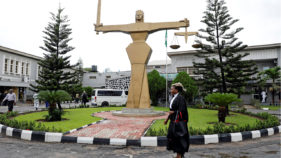 |
| Court |
Honourable Justice Nnamdi Dimgba of the Federal High Court, Abuja, has threatened to order the arrest of a former Accountant-General of the Federation, Jonah Otunla, for failing to appear in court for trial.
Otunla is being prosecuted by the Economic and Financial Crimes Commission (EFCC) on five counts of money laundering involving the diversion of about N2bn from the account of the Office of the National Security Adviser.
He was to be arraigned on December 7, 2017, along with one Ade Adelakun, and seven other companies – Gold Reef Industries Limited, Lambster Nigeria Limited, G.C. Electronic Limited, Sinmilak Nigeria Limited, Wehsac Farms Limited, Shepherded Field Global Resources Limited and Stellavera Development Company Limited – but his absence stalled his arraignment.
The case was adjourned till January 22, 2018, but he was again absent in court; although his counsel, Ahmed Raji, SAN, represented him.
His absence stalled the trial, as Adelakun, who was present in court, could not take his plea.
Raji had told the court that his client had travelled “for medical treatment abroad.”
Following his absence again on Tuesday, the court adjourned the case till February 7, stating that if he was absent at the next adjourned date, it would be compelled to hear the application of the prosecution seeking a warrant for his arrest.
According to a statement by the acting EFCC spokesman, Tony Orilade, Otunla’s absence had also stalled his arraignment on April 30, 2018, prompting the prosecution, led by Francis Jirbo, to file an ex parte motion seeking the issuance of a warrant of arrest against him.
The statement said, “Otunla and Adelakun were investigated by the EFCC and had responded by making statements in writing, while their accomplice, Fadile, bolted out of the country and is currently said to be living in the United Kingdom as a fugitive.”
At the resumed sitting on January 15, 2019, Otunla was again absent in court; but a new twist was brought to the trial when the judge was informed that Adelakun was dead.
Justice Dimgba, however, ordered the defendant to produce a death certificate as evidence before the court “or an affidavit of death to be filed to authenticate the death.”
Otunla is being prosecuted by the Economic and Financial Crimes Commission (EFCC) on five counts of money laundering involving the diversion of about N2bn from the account of the Office of the National Security Adviser.
He was to be arraigned on December 7, 2017, along with one Ade Adelakun, and seven other companies – Gold Reef Industries Limited, Lambster Nigeria Limited, G.C. Electronic Limited, Sinmilak Nigeria Limited, Wehsac Farms Limited, Shepherded Field Global Resources Limited and Stellavera Development Company Limited – but his absence stalled his arraignment.
The case was adjourned till January 22, 2018, but he was again absent in court; although his counsel, Ahmed Raji, SAN, represented him.
His absence stalled the trial, as Adelakun, who was present in court, could not take his plea.
Raji had told the court that his client had travelled “for medical treatment abroad.”
Following his absence again on Tuesday, the court adjourned the case till February 7, stating that if he was absent at the next adjourned date, it would be compelled to hear the application of the prosecution seeking a warrant for his arrest.
According to a statement by the acting EFCC spokesman, Tony Orilade, Otunla’s absence had also stalled his arraignment on April 30, 2018, prompting the prosecution, led by Francis Jirbo, to file an ex parte motion seeking the issuance of a warrant of arrest against him.
The statement said, “Otunla and Adelakun were investigated by the EFCC and had responded by making statements in writing, while their accomplice, Fadile, bolted out of the country and is currently said to be living in the United Kingdom as a fugitive.”
At the resumed sitting on January 15, 2019, Otunla was again absent in court; but a new twist was brought to the trial when the judge was informed that Adelakun was dead.
Justice Dimgba, however, ordered the defendant to produce a death certificate as evidence before the court “or an affidavit of death to be filed to authenticate the death.”
In this article:
